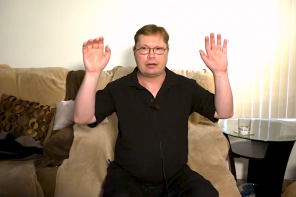There’s a 40-year interval between Stephen Levine’s previous book of poetry and his latest—that’s quite a span. In the interim, he’s not remained silent. Indeed, you may recognize his name as a bestselling spiritual author. If you’ve read any of his books, you might have noted how poetic his prose is: its awakening quality of mind, and openness of heart. So, when a reader once complained to the author how his book Who Dies? made no mention of what poets wrote the poems he inserted in the prose, he was actually quite pleased: all the writing was his own.
Before this 40-year-long road began, he’d seen and been part of that seminal, mid-century opening of America to poetry, spearheaded by Richard Brautigan, Diane diPrima, Allen Ginsberg, LeRoi Jones (now Amiri Baraka), Kenneth Rexroth, and others. He hosted a venue in New York City for poetry readings, and published three books of his own poetry. Then something else called to him. As he recalls, “The same place we meet poetry, we meet each other: the higher level of consciousness we call intuition. The intuition from which poetry is recorded, reported, became very important in connection with healing.” This calling to healing led him to work with the dying, relationship as spiritual practice, and living each day as if it were your last. What could be more meaningful—or poetic—than that?
“Following the old alphabet home”
His life work prepared the ground for Breaking the Drought. The title is a key to the book’s deep reach. Two obvious references are: the personal, in the author’s return to poetry… and global, as in global warming. In the mountains of New Mexico where he lives, there’s been little rain for eight years. 40% of forests have been lost. It also evokes poetry’s shamanic lineage, extending back to humankind’s earliest rain-bringers and tribal healers. In the Edo period of Japan, for instance, Kikaku, a close disciple of Zen haiku master Basho, reputedly ended drought by reciting poetry.
The flipside of drought is water, and the book continues elementally, in sections which I take to pertain to earth (incarnation), air (devotion), fire (death and dying), and the human (teachers along the path). To appreciate the grace with which the poet treats each, consider the many aspects of water he evokes: oceans, and tears, the amniotic ocean of birth, the source of great river civilizations, and water as medium of transformation (as in a drop of water becoming a pearl). This multi-dimensional approach ranges from the luminous particular (an essential to poetry), as in “First rains chasing turquoise-bellied geckoes/ up the stony arroyo walls”—to the figurative, as in:
A drop of pond water under the microscope
just like in science class
but now you are the pond
and the microscope is mindfulness.
A true seer, Levine’s poetry is visionary. He can write ballads or hymns with profound clarity and timeless heart, such as “If prayer would do it,” “When human beings meditate,” “There is an elemental love,” and “There is a silence between breaths.” Such poetry is also a form of teaching, that pure poetry through which the prophets and avatars amongst us have often spoken.
He also continues where he left off, from his previous books of poetry, to forge a poetic true to his 40-year-long experience of What Is. Call it Surreal Dharma Jazz, for want of any better rubric. Consider this fragment: “…following the old alphabet home vertebra by/ vertebra, genus by genus, up the serpent/ into the skull—‘bowl of stars’…” Hear how landscape and inscape, here, are as one. And then it draws upon the phenomena of language itself (“the old alphabet”), that leads us back to the literal spine along which life evolves (“genus by genus”)—capped by one concentrated image fusing the cranial dome with the vault of the heavens. There’s an identifiable meter underlying it—dactylic—but the poem’s rhythm also summons one-pointed concentration upon the complexity of breath in tandem with devotion to the unknowable.
Reading this, I wonder: do I still have a top to my head?
Words as Stepping Stones
Readers may not be familiar with ancient yogic teachings of primal energy (kundalini), pictured as a serpent or goddess, coiled sleeping at the base of the spine, waiting to be awakened. No matter. The power of the symbol communicates. Such poetic is, in and of itself, initiatory; a guardian of thresholds, upholding mysteries as it reveals them.
As texts for spoken word, his poems likewise kindle higher consciousness. Aloud, they awaken awareness—words become stepping stones. He writes, “The words offer handhold after handhold as I climb/ Grace in every breath,” and “My prayers are in the silence/ between breaths.” In a breath-based culture, we can become aware how each moment holds a range of texture and nuance (image, idea, and sound), taking us beyond the fixation of the skin-encapsulated ego and the logjam of discursive thought, re-minding us of our true home, our Original nature.
Through such intelligent alertness—mindfulness—we access our kinship with the universe. This awareness is immeasurable, unborn, and never dies. Communication within this dimension can occur through “…the emotional Braille in each other’s eyes/ like watching the road ahead/ wind through the mountains…”
“One Soul, We All Share It”
In a prose introduction to the final section, Levine shares with us a credo, inviting us into the solitude in which his poetry occurs:
A boundaryless aloneness, created perhaps when the One is cleaved into the many (or the Big Bang scatters our parts) leaves a strange and reminiscent aftertaste, the homesickness for our original Oneness. It reaches from superficial thought down to the substratum of the psyche. It knows us better than we know ourselves.
This is quite a different ars poetica than the “First thought, best thought,” that Allen Ginsberg espoused (via his teacher Chogyam Trungpa). It is, rather, the intuition, mentioned earlier, wherein we can confront such vital questions as “Who am I?” and “How can I deal with my pain?” It’s precisely here we can awaken to our inner teacher. To that aim, Stephen Levine’s exemplary poetry inspires us to trust our own vision, hold it, make it whole.
To put a sharper point on that, this trust in intuitive vision isn’t solitary, but has been honed by a 40-year-long road engaged with the brokenhearted and the dying. Speaking about this during one of his public readings of Breaking the Drought, he says:
There is no time in which we have a higher opportunity of wisdom and freedom than in aging. We have perspective, a time to see things we have loved fallen away. We can protect nothing from death and impermanence. [It’s] a place of surrender in which surrender is not defeat.
We don’t even know we can do in the face of the Beloved. You don’t talk in the face of the beloved, who hears you like a dog hears you. The beloved space inside you is so big it doesn’t stop at your edges, and it permeates everyone—one soul, we all share it—the universal qualities beyond mine and thine, opening to 10,000 other beings in same state. We find a place where there’s peace. We find a place where we are already out of the pain (even if we haven’t cured it). My pain and your pain separate us. Your love and my love connect us.
Poetry, Under the Radar
No “rugged individualist,” Levine acknowledges his debt to forebears (Rumi and Basho, Rexroth and Machado). Yet he’s a trailblazer on the path where Contemplative Art (poetry, music, dance) and the Art of Contemplation (mindfulness, yoga, prayer) are as one. We owe the publisher great credit for the book’s generous helping of 81 poems. (Today’s standard format for poetry is 40 to 60 pages.)
Yet we must also acknowledge that though his books of prose have found over a million readers, this newest book, a return to poetry, flies under the radar. It’s interesting, in passing, to note three reasons why. One is the still-marginal place of poetry in American culture. True, we’ve sparked a now-global revival of spoken arts in the form of hip-hop and rap. But for book publishers, the “poetry marketplace” (a kind of oxymoron, since poetry operates largely outside the cash nexus), is largely fueled by writing programs in academia. True, Coleman Barks’ renditions of medieval Sufi poet Rumi captivated a national audience, for a spell. But America’s own living, devotional, mystic poets find a much smaller audience, and slip through the cracks of critical discourse; examples that come to mind include Jim Cohn, Patricia Donnegan, Rick Fields, Jonathan Greene, Susan Griffin, Latif Harris, Dan Leighton, Russell Leong, John Martone, giovanni singleton, Will Staple, Robert Sund, and Dorothy Walters.
Secondly, there’s the diverse lineage upon which Stephen Levine draws. While he was a pioneer in bringing Theravada Buddhism to America in the 1960s, he’s studied under Neem Keroli Baba and Nisargadatta Maharaj as well; so, unlike most Buddhists, he might refer to God (a.k.a. the Beloved, the One). There’s nothing wrong with that, of course: the Buddha’s teachings on the art of happiness don’t depend on God, but many Westerners turn to the Buddha Way because they’re turned off by such belief.
Thirdly, while today’s spiritual teachers are wont to tour in order to maintain their following, his health has, alas, precluded that option.* Thus it is that you are reading the only review, to date, of this incomparably marvelous book, a treasury of good soul medicine.
So, let us welcome Stephen Levine’s return to poetry. Breaking the Drought can also refer to a return to one of humanity’s most ancient of spiritual practices: sacred speech. As such, it’s a link back to a continuity temporarily severed by the Technological Revolution. It is a link we need in order to live in a fragmented world, dislocated by loss of spiritual unity. Meanwhile, with such grounding our collective drought continues, literally and figuratively.
We cannot form words with breath alone: the mouth needs moisture in order to speak. In Native American tradition, according to José Hobday, this is one of five essential internal moistures. Tears are the moisture of compassion. Sweat is the moisture of working, of suffering, and of serving. Urine is the moisture of purification. Sexual liquids are the moisture of love and continuance of life. In all dimensions, water is a precious essential, and so is Stephen Levine.
*The good news on that front is that recently some friends of Stephen Levine and his wife Ondrea have put together an online site Levine Talks, including videos, teachings, and… poetry.




